Introduction
Zubeen Garg was one of India’s most celebrated singers, songwriters, and music directors, best known for his multi-lingual hits and pioneering impact on Assamese and Bollywood music. Revered across the country, Zubeen’s powerful voice and unique artistry left an indelible mark on Indian entertainment. This biography revisits his inspiring journey, highlighting his early life, musical achievements, and contribution to Indian culture.
Early Life and Background
Born on November 18, 1972, in Tura (Meghalaya), Zubeen Garg grew up in Assam in a family deeply connected to music and literature. His father, Mohini Mohan Borthakur, was a renowned lyricist, and his mother, Ily Borthakur, a gifted singer. Influenced by their passions, Zubeen took up multiple instruments and soon began composing his own melodies. The name ‘Zubeen’ was inspired by the famous conductor Zubin Mehta, while ‘Garg’ came from his family’s gotra.
Musical Career: From Assam to Bollywood
Zubeen debuted with the Assamese album “Anamika” in the early 1990s, quickly gaining popularity with his fresh sound and deep lyrics. He sang in over 40 languages, including Hindi, Assamese, Bengali, Nepali, and Bodo. His Bollywood breakthrough came with the chart-topping song “Ya Ali” from the movie “Gangster” (2006), followed by hits such as “Dil Tu Hi Bataa” from “Krrish 3” and “Jaane Kya Chahe Man” from “Pyaar Ke Side Effects”.
Major Achievements
- Released more than 30 albums and recorded thousands of songs.
- Proficient in numerous musical instruments including guitar, tabla, harmonium, and keyboard.
- Won the National Film Award for Best Music Direction for “Echoes of Silence” (non-feature film).
- Honored with an honorary D.Litt. by the University of Science and Technology, Meghalaya in 2024.
Acting and Directing Career
Apart from singing, Zubeen acted in and directed several Assamese films. Notable projects include “Kanchanjunga,” “Mission China,” and “Mon Jai.” He was known for promoting Assamese cinema and culture and was often referred to as Assam’s greatest music ambassador.
Personal Life and Values
Zubeen married fashion designer Garima Saikia in 2002. He was known for his philanthropy, support for young artists, and open advocacy of social harmony in India. Garg openly described himself as irreligious and often worked for the betterment of society through music and charity.
Final Days and Unfortunate Demise
In September 2025, Zubeen Garg was in Singapore for the North East India Festival. Tragically, he passed away on September 19, 2025, following a scuba diving accident. His untimely death shocked millions, and heartfelt tributes poured in from across India and abroad.
Legacy
Zubeen Garg’s music continues to inspire new generations. He not only popularized Assamese music throughout the country but also bridged the gap between folk traditions and contemporary Indian sound. His life is a testament to the power of passion and versatility in India’s rich cultural landscape.

